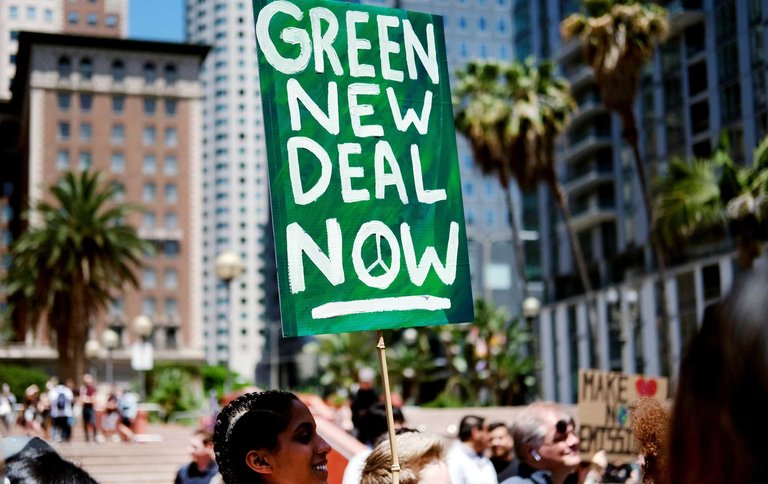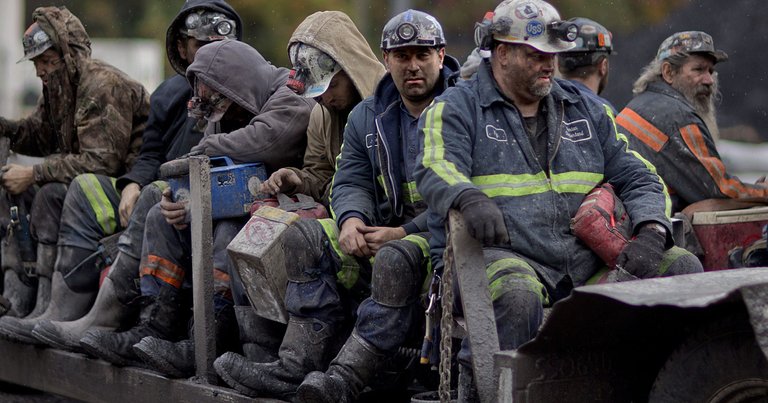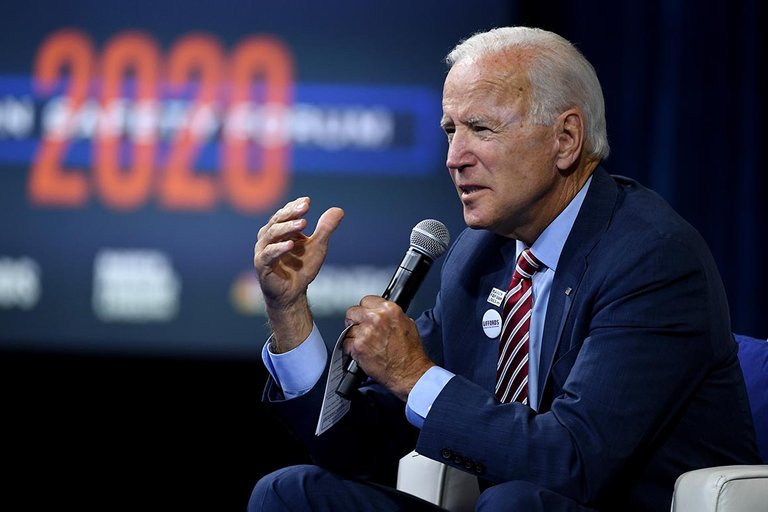

Bernie Sanders not only wants to tackle the climate crisis with his proposal. He wants a green economy that protects working people and vulnerable communities. Over a period of 15 years, he wants to budget the enormous sum of 16.3 trillion dollars.
Joe Biden, a former vice-president under Obama, foresees 1.7 trillion dollars in his climate plan, one-tenth of the amount Sanders proposes (Sanders symbolically launched his plan in the town of Paradise in the state of California).
The New Deal in the title of his plan refers to the historic New Deal by Franklin Delano Roosevelt, president from 1933 to 1945. His New Deal was not a single plan but a set of programs, public works projects, financial reforms (such as the separation of ordinary banks and savings banks). It was Roosevelt's answer to the economic crisis of the Great Depression.
1. 100 percent renewable energy and 20 million jobs
Sanders’s plan goes beyond what the IPCC, the climate panel of UN scientists, is proposing. They want 100 percent renewable energy by 2050. Sanders wants to meet that deadline by 2030, starting with the fossil-fuel-based industry, the transport sector, and the energy sector.
He also wants to join the Paris Agreement again and pledge $200 billion for support to developing countries suffering from the effects of climate change.
Sanders rejects the "false solutions" of his Democratic competitors, such as a further development of nuclear energy, waste incineration and the development of new techniques for removing carbon from the air (geo-engineering).
His plan is largely the same as the Green New Deal that federal MP Alexandria Ocasio-Cortez and federal senator Ed Markey submitted as a bill in February 2019. However, their plan does not take a position on nuclear energy and carbon recovery.
Sanders makes the biggest distinction with his climate plan by not seeing the climate crisis as a separate problem in itself. According to him, climate transition must at the same time have the ambition to form a socially equitable society, with an economic system on a human scale, not directed by the large multinationals, such as now.
The wording in his plan does not lie. He does not avoid the taboos:
Bernie recognizes that the Pentagon is the largest institutional emitter of greenhouse gases in the world and that the United States spends $81 billion annually to protect oil supplies and transport routes. We are uniquely positioned to lead the planet in a wholesale shift away from militarism.

2. End the greed of the fossil Fuel Industry
The title of the second chapter of his plan says enough: “End the Greed of the Fossil Fuel Industry and Hold them Accountable.”
Instead of working to find solutions to the coming crisis, the fossil fuel industry poured billions into funding climate denialism, hiring lobbyists to fight even the slightest government regulation and oversight, and contributing to politicians who would put the interests of fossil fuel executives over the safety and security of the planet.
Fossil fuel corporations have fought to escape liability for the pollution and destruction caused by their greed. They have evaded taxes, desecrated tribal lands, exploited workers and poisoned communities. Bernie believes this is criminal activity, and, when he is President, he will hold the fossil fuel industry accountable.
A first step is the complete cessation of the $15 billion that the oil industry receives every year as subsidies and the withdrawal of all permits for the construction of new infrastructure (such as pipelines). The reaction that the industry will give to this is predictable: they will point out the consequences for their employees.
3. A just transition for the workers affected
The third chapter of his plan gives an unmistakably clear answer to this.
The clean energy economy, which will create three times more jobs and a full-employment economy, must also build strong unions, high wages, and benefits…. Coal miners and oil-rig operators are not the problem.
Fossil fuel workers have powered the country for more than a century, working in dangerous and precarious jobs to provide for their families. They have given their lives on unsafe, under-regulated worksites, and they have seen their pensions get cut, their health care get stripped away, and their jobs disappear while fossil fuel executives rake in billions.

His plan includes several measures to accommodate the transition for these working people. He wants to achieve this with unemployment benefits, training, and guaranteed pensions. If you wish, you can take four years of paid leave with guaranteed social security to study at a university or a technical school.
The ecological consequences of the current economy also need to be addressed:
There is no doubt that the poor and marginalized suffer from the impacts of pollution and climate disruption — particularly communities of color. They are at the frontlines of the climate emergency. For example, of the 73 waste-burning incinerators across the United States, an astounding 79 percent are located within three miles of low-income and minority neighborhoods, which are exposed to mercury, lead, and soot.
The Green New Deal is not only a serious climate plan, but an opportunity to uproot historical injustices and inequities to advance social, racial, and economic justice, including redressing the exclusion of black, brown, Native American, and other vulnerable communities from the programs that made up the original New Deal.
(In his plan, Sanders repeatedly refers to President Franklin Roosevelt's first New Deal in the 1930s.)

Unaffordable
There is much more to Sanders' plan, too many to list here. His opponents already condemn it as unaffordable (just as the opponents of the first New Deal claimed).
On the other hand, the military spending and the massive support that the US government gave to the banking sector and large corporations is never called unaffordable, neither the huge remunerations of business executives.
Sanders also wants to strongly limit the opportunities for the fossil industry to make a profit. He proposes a complete ban on import and export of oil and gas, a total ban on open mining and fracking and a moratorium on licenses for drilling in public domains.
That is not only a total reversal of Trump's current policy but it also runs contrary to the large expansion of oil extraction in the US itself by its predecessor Obama.
With his 2016 campaign, Sanders had already shifted the bar to themes that were not a subject for him during the media-sponsored debates, such as the idea of public health care.
He is now doing this again with this plan. All other candidates are now required to argue why they want to spend less, while their original intention was to show that they were willing to invest in a new economy.

According to the polls, Joe Biden is still the biggest contender.
Whether Sanders will be nominated for the Democratic Party this time is still very uncertain. The real primaries are still months away. However, a number of phenomena are already coming back. Where Sanders was initially ridiculed, silenced or misrepresented in 2016, everything is now being done much earlier to boycott his candidacy.
MSNBC, which sells itself as a liberal-progressively broadcaster, has repeatedly and selectively reported on his candidacy. For example, polls were shown in which Sanders was not even included. Like most other channels, MSNBC derives a lot of revenue from advertising for the oil industry and from other companies managed by those companies, such as the arms industry (itself also a major source of oil consumption).

The full text of the Green New Deal can be found here.
If you're interested, some articles about the new green deal and the opposition it faces:
- Bernie Sanders’ Green New Deal is the most progressive in the race
- Bernie Sanders’s Green New Deal Is a Climate Plan for the Many, Not the Few
An interesting article about militarism:
Thanks for stopping by!!
Are Bernie and Joe going to be the main contenders for the next elections, Do you think?
I'd certainly be interested to see if Sanders can pull this off. It's an ambitious budget and you have to wonder where it would come from. The $15 billion from fossil fuel subsidies would certainly help. I wonder how much would be pulled back in from the military spending. It's good to see some discussion on how these things might be implemented, rather than the vague promises with no explanation of how they can be achieved. I was rather expecting that this article was going to leave me hanging again on that front, but you didn't. Thanks for sharing.
Posted using Partiko Android
@therealwolf I understand why you have decided to downvote this message, but the only thing I wanted is a little bit of visibility, to continue growing. You have just 'destroyed' 7% of my total SP. I don't think you realize this. A little harsh isn't it... Well, 7% of almost nothing remains almost nothing...
Hello. Currently there are a lot of curation groups and whales curating amazing content, there's no need to buy votes. The downvote you received is to discourage the buying of votes from bidbots. We kindly invite you to join us on the #NewSteem attitude, where good content receives votes and the organic content get the most attention. Buying votes hurts you, other authors and the Steem Ecosystem in general, please don't do it.